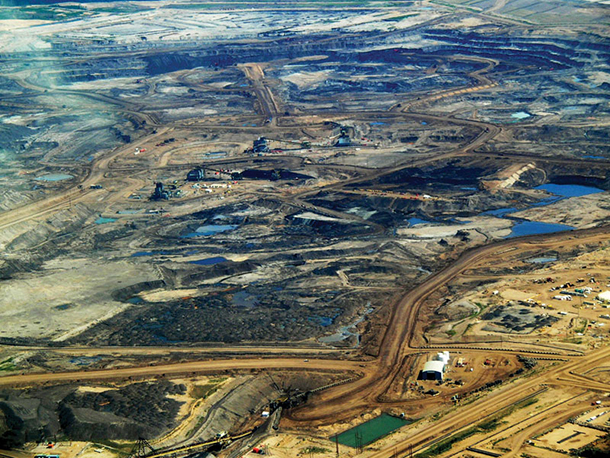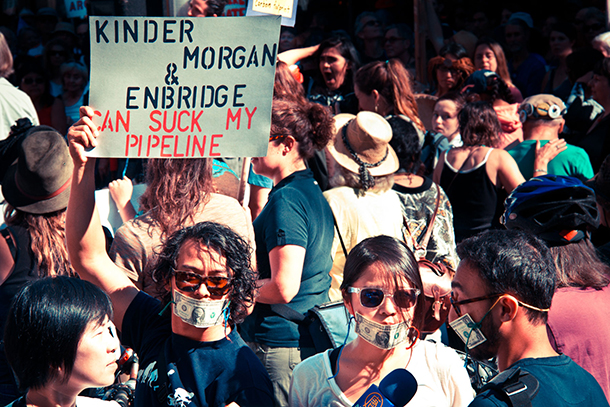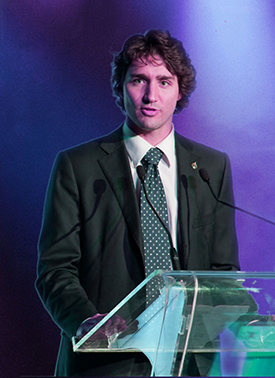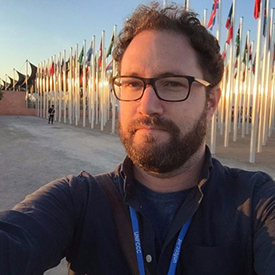Canada’s Choice: Tar Sands or the Climate
Air Date: Week of February 3, 2017

An aerial view of an oil sands operation in Alberta, Canada. (Photo: Dru Oja Jay, Flickr CC BY 2.0)
On January 24, the White House called for the building of the Keystone XL pipeline to carry Canada’s tar sands to Gulf coast refineries, creating a dilemma for Canadian Prime Minister Justin Trudeau. And other pipelines he’s approved already may make it almost impossible to meet pledges under the Paris Climate Agreement, says a new report from advocacy and research group Oil Change International. Living on Earth host Steve Curwood spoke with the report’s co-author Adam Scott.
Transcript
CURWOOD: With the Trump White House breathing new life into the Keystone XL pipeline, Canadian Prime Minister Justin Trudeau finds himself walking a tightrope. The Obama administration in November 2015 rejected Keystone XL, which would transport carbon-heavy tar sands oil from Alberta to refineries on the Gulf of Mexico. Prime Minister Trudeau recently approved the expansion of two other pipeline projects within Canada, saying the country could support jobs and still honor global warming cuts pledged for the Paris Climate Agreement. But a new report from Adam Scott of the research and advocacy organization Oil Change International claims any new pipeline blows through those climate targets. Adam Scott joins me now from Toronto. Welcome to Living on Earth.
SCOTT: Thanks for having me.
CURWOOD: So, we learned that, perhaps about two months ago, Prime Minister Trudeau had approved the expansion of the pipeline to the west and the Enbridge line 3 pipeline to the east in Canada, and you recently published a report which looks into the effects of these pipelines on Canada's carbon emissions. What did you find?
SCOTT: Well, we really found that the combination of all these different pipeline projects would make it impossible for Canada to meet its obligations under the Paris Agreement, which went into force last year. But we also found that it would contribute so much carbon to the global pool of fossil fuels being produced that it would prevent global action on climate as well, so it would actually make it difficult for other countries outside of Canada to ultimately meet their goals. If you add Keystone to the other pipeline projects and assume that all of those pipelines get filled with new tar sands oil, it's a huge increase in greenhouse gas pollution.
It's important to understand why tar sands are such a huge target for people who really care about climate change. And it is because, unlike conventional oil wells where you drill a well and the oil well just produces for couple years and then declines, tar sands projects are designed to produce for 40 or 50 or 60 years, and so over the lifetime of these projects the total cumulative amount of emissions is gigantic, and that's what we really care about from a climate change perspective.
CURWOOD: So, tell me how economically feasible are these oil sands pipeline projects currently given that the oil is, what, around $50, $52 a barrel right now.

Public opposition to the two recently approved Canadian pipelines has been long-standing. Above, in 2014 women held a demonstration in Vancouver in solidarity with the People’s Climate March in New York City (Photo: Chris Yakimov, Flickr CC BY-NC-ND 2.0)
SCOTT: Yeah, at the moment there's not a lot of argument to build them. Conditions have really changed over the last two years. The price of oil, we used to see $110 a barrel, upwards of $150 a barrel over the last five or so years ago. But two years ago we saw a crash in the price, bringing it down are as low as $30 something dollars a barrel, and that's just not high enough to sustain tar sands projects which are amongst the most expensive types of oil projects on the planet. And so, you know, if oil prices stay very low, and many expect that they will in the near term at least, pipeline projects make no sense.
CURWOOD: So, Adam, what do you think the price of oil would have to get to for tar sands oil extraction to be economically feasible?
SCOTT: In order to move forward with new investments on tar sands projects, we need to see an oil price of between $75 and $100 a barrel, and that price has to be sustained over a long period of time, as well as having access to pipelines. So, that's what's required and there's not a lot of evidence at the moment that prices will stay that high.
CURWOOD: Now, let's talk about the Keystone XL pipeline that President Obama rejected, and Donald Trump is willing to give it a green light. How would the economics work right now for Keystone XL?
SCOTT: Well, right now the project would've been entirely dependent on companies looking to export their product down into the Gulf Coast of the US. And, you know, at the moment, there's already enough pipeline capacity to ship everything that Canada is producing. So, the pipeline project was largely about future projects. So a huge number of major tar sands projects were scheduled to come online in the future that would eventually fill the pipeline and make it profitable. When the oil price crashed, a number of tar sands producers, oil companies, decided to pull out their investments, and at the moment, we haven't seen any new investment in a tar sands project of any size over the last two years. So, if conditions continue, Keystone makes no economic sense.
CURWOOD: Answer me this. If oil is only at $50 or $55 a barrel, to what extent are the tar sands oil producers actually losing money?
SCOTT: Well, it's an interesting thing. The way a tar sands project works is you spend all your money upfront. So, it can cost billions of dollars to produce, say, a large tar sands mine, and it can take years to get into production. It takes 10 or 20 years to pay back one of these projects, and so the producers, even if they’re losing money on every barrel will have to keep producing. And that's what is so scary. Once the projects are built, it is very hard to turn them off, which causes huge problems as we try to transition the world off fossil fuels.

Canadian Prime Minister Justin Trudeau will need to balance his promises made at the Paris Climate Agreement with those he made to the oil sands industry in Alberta. (Photo: Laurel L. Russwurm, Flickr public domain)
CURWOOD: So, you're telling me that if there were to be a Keystone XL, the first 10 or 15 years would be just making the money back before it would even "make money"?
SCOTT: That's right. It could even be longer than that depending on how much the project costs, and so you can see that we’d be in a position where we can't turn these things off. If we're still in a position where we have large fossil fuel producers still operating and pipelines still running in 2040 or beyond, we're in deep trouble because by 2050 we really have to be looking at bringing our use of fossil fuels down to as close to zero as we can. That is what is required by the climate scientists to stay safe.
CURWOOD: How likely is it for TransCanada go forward with the Keystone at this point?
SCOTT: It's hard to say. We know that TransCanada actually, when they lost the approval, when Obama rejected Keystone about a year and a half ago, decided instead to pack up and take its cash and to spend it elsewhere. And they went out and purchased another pipeline company based out of Texas which has a whole pipeline system in the US and natural gas interest there. So, they spent, I believe, around $10 billion acquiring a different company. In addition, the project today would be far more expensive than originally proposed, billions of dollars more than the cost than it was originally proposed for, so it may not be profitable for them to go after the project.
CURWOOD: Tell me, why does Justin Trudeau in theory favor a Keystone XL when he also favors the Paris climate agreement?
SCOTT: Prime Minister Trudeau has put a lot of political capital and effort into saying he cares about climate change and that he understands what is required. And he's gone internationally to a number of different places and promised that Canada would be a leader globally on climate change. So, it really makes no sense that he's come out in support of pipelines.
Really, this has nothing to do with the pipelines themselves in Canada. This is about signaling to the oil industry that he's going to support them, and so it's largely about regional politics in Canada where politicians are keen to show, in particular voters in Alberta, where the tar sands are located, in the west, that they're going to do something to help them. His father was also the Prime Minister and PR Elliott Trudeau implemented a policy called the national energy program which was seen as taking money directly from the oil industry. And so, many folks out in Canada's western oil patch still hold a grudge about that. So, very early on in his administration, Trudeau went out and promised that he would not be like his father. And so he is very sensitive to try to at least appear like he's doing everything he can to support the oil industry. The crash in the oil industry over the last couple of years has laid off tens of thousands of workers operating in the tar sands, and it has had nothing to do these pipelines, but it is a way for politicians to show that they care and they’re trying to do something about it.

Adam Scott is a Senior Campaigner at Oil Change International and is based in Toronto, Canada. (Photo: Adam Scott)
CURWOOD: Well, so what are the options now, then, for the Canadian government in terms of saving face with environmental activists as well as industry?
SCOTT: Well, I think the big thing is that the Canadian government just rolled out its first ever serious climate policy, just a few months ago. And that climate policy has they have lots of great things in it: Reducing emissions from buildings and vehicles, and there's going to be a carbon tax in Canada. But the thing it didn't do was, address how are they’re going to address emissions from the oil industry. It's this huge blind spot. A credible climate policy would basically say, no new development of fossil fuel projects going forward.
CURWOOD: In the broader Canadian society, just how much do Canadians care about Mr. Trudeau's position on the climate and what he's doing to address it?
SCOTT: Climate change is an issue that rates very highly in Canada. A lot of Canadians care quite a bit, and there are very strong opinions across the country on both sides of this debate, but we've seen every year the concern sort of rising. And Canadians were very, very proud when Trudeau went to Paris and promised that we’d meet the goals of the Paris agreement, that we would do our fair share, and more than our fair share, on this issue. So it's a real problem that Canada's going to fail on this if it doesn't do something extra.
CURWOOD: Adam Scott is based in Toronto as a Senior Campaigner for Oil Change International. Adam, thanks so much for taking the time with us today.
SCOTT: It's been great speaking with you.
Links
NYTimes: “For Justin Trudeau, Canada’s Leader, Revival of Keystone XL Upsets a Balancing Act”
Yale e360: “Canada’s Trudeau is Under Fire for his Record on Green Issues”
Washington Post: “Canada accelerates plan to phase out coal power, targets 2030”
Living on Earth wants to hear from you!
Living on Earth
62 Calef Highway, Suite 212
Lee, NH 03861
Telephone: 617-287-4121
E-mail: comments@loe.org
Newsletter [Click here]
Donate to Living on Earth!
Living on Earth is an independent media program and relies entirely on contributions from listeners and institutions supporting public service. Please donate now to preserve an independent environmental voice.
NewsletterLiving on Earth offers a weekly delivery of the show's rundown to your mailbox. Sign up for our newsletter today!
 Sailors For The Sea: Be the change you want to sea.
Sailors For The Sea: Be the change you want to sea.
 The Grantham Foundation for the Protection of the Environment: Committed to protecting and improving the health of the global environment.
The Grantham Foundation for the Protection of the Environment: Committed to protecting and improving the health of the global environment.
 Contribute to Living on Earth and receive, as our gift to you, an archival print of one of Mark Seth Lender's extraordinary wildlife photographs. Follow the link to see Mark's current collection of photographs.
Contribute to Living on Earth and receive, as our gift to you, an archival print of one of Mark Seth Lender's extraordinary wildlife photographs. Follow the link to see Mark's current collection of photographs.
 Buy a signed copy of Mark Seth Lender's book Smeagull the Seagull & support Living on Earth
Buy a signed copy of Mark Seth Lender's book Smeagull the Seagull & support Living on Earth

